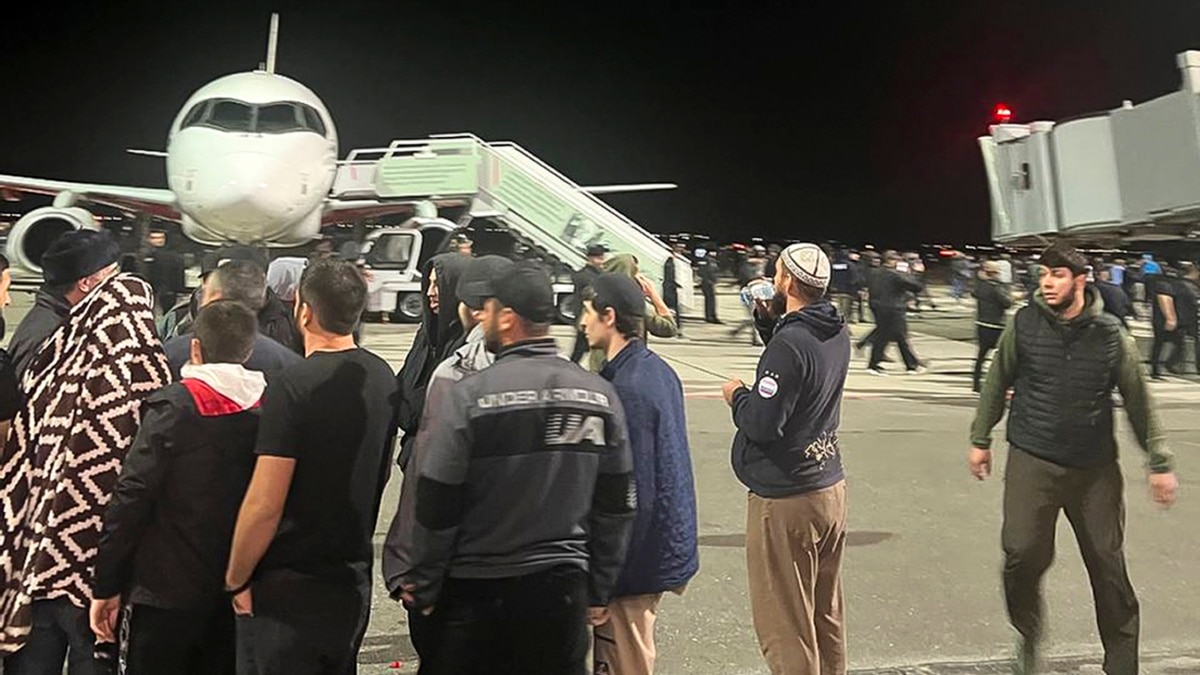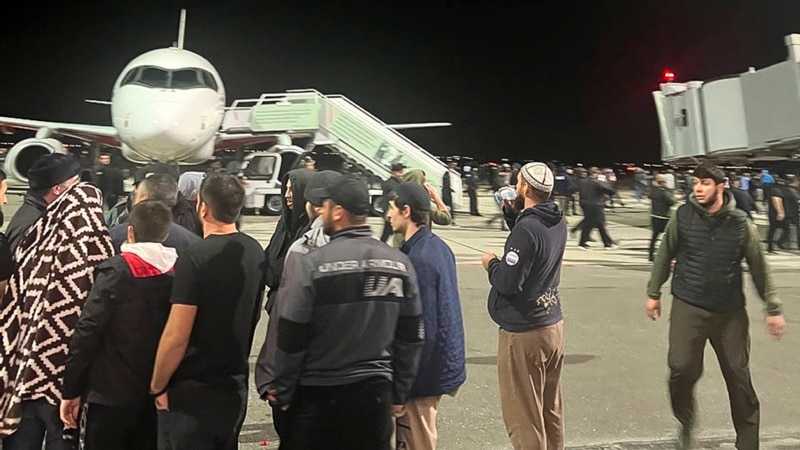Russia Baselessly Accuses Ukraine of Complicity in the Dagestan Pogroms

On November 2, Sergey Melikov, the head of Dagestan, told Russian President Vladimir Putin that police had identified and arrested 150 organizers of and participants in the anti-Jewish riot. On October 29 hundreds of people gathered at the airport in the region’s capital, Makhachkala, trying to prevent from entering Dagestan passengers who had arrived on a weekly flight from Tel Aviv.
Dagestan is home to an estimated 1,200 Mountain Jews, who are of Persian descent and live mainly in Azerbaijan and Russia’s North Caucasus republics.
Holding anti-Israeli signs and Palestinian flags and chanting “Allahu Akbar!” and pro-Palestinian slogans, the rioters overran the airport’s terminal, vandalizing and looting for hours — until the police were able to oust them from the airport.
On October 30, a day after the Dagestan rioting, Putin repeated previously voiced condemnation of Israel and reiterated support for Gaza.
He baselessly claimed that the United States orchestrated the Israel-Hamas war and his own war with Ukraine, among other conflicts, calling Washington “bloody” and a “global dictatorship.”
Putin also accused “the United States and its satellites” of being behind the antisemitic riots in Makhachkala.
Putin’s authorized long-term biographer and “favorite journalist,” Kommersant correspondent Andrei Kolesnikov, wrote in the newspaper that Putin, in “speaking about Arabs” in the Gaza Strip, had “allowed himself emotions that were probably not in the original text of the speech.”
“There is no justification for the terrible events taking place in Gaza now, where hundreds of thousands of innocent people are being killed indiscriminately, without having anywhere to flee or hide from the bombing,” Putin said. “When you see blood-stained children, dead children, the suffering of women and old people, when you see medics killed, of course, it makes you clench your fists as tears well in your eyes.”
Blaming the U.S. and Ukraine for anti-Jewish riots in Russia seems to be part of Moscow’s official narrative, as several high-ranking Russian officials repeated Putin’s accusations. They include Dagestani head Melikov, Putin’s envoy in the North Caucasus Yuri Chaika, Kremlin spokesperson Dmitry Peskov and Russian Foreign Ministry officials.
During an October 30 news briefing, Russian Foreign Ministry spokesperson Maria Zakharova claimed Moscow had evidence that Ukraine was behind the pogroms.
“In the implementation of yet another destructive action, a direct and key role was assigned to the criminal Kyiv regime, which in turn acted through the hands of notorious Russophobes who have settled there. … It is significant that in the calls for riots, resources associated with the fugitive provocateur I. Ponomarev were noticed.”
Russia’s accusations against Ukraine and the U.S. are unsubstantiated.
The Institute for the Study of War, a Washington, D.C.-based think tank, reported that calls for violence seemingly “originated” from “Morning Dagestan,” a Russian-language channel on the Telegram messenger.
At the heart of Russian accusations against Ukraine and the U.S. is the connection between the Morning Dagestan channel and Ilya Ponomarev, a Ukraine-based Russian opposition figure. In May and August, Moscow accused Ponomarev of orchestrating armed raids from Ukraine into Russia’s Belgorod region that killed at least 16 Russian servicemen.
Ponomarev, formerly a deputy in the State Duma, the lower house of Russia’s parliament, emigrated to Ukraine in 2014 after voting against Moscow’s annexation of Crimea and opposing its orchestration of the conflict in Ukraine’s Donbas region. Ponomarev does not hold any government positions in Ukraine or any Western country.
Ponomarev told Polygraph via Facebook Messenger that he created the Morning Dagestan channel as part of his “project to fight military conscription in Russia,” but that he had “handed over control and stopped financing it in November 2022.”
However, the BBC reported that Ponomarev called Morning Dagestan “our channel” this past August and referred to the Telegram channel as “part of his operations” in September.
Still, Ponomarev’s contradictory statements about his relationship with Morning Dagestan does not prove that the Telegram channel’s recent antisemitic tone has anything to do with the Ukrainian or U.S. authorities.
Morning Dagestan, which was blocked by Telegram following the accusations of inciting the anti-Jewish riots, previously stated that its editorial policy is determined by a person “who was born in Dagestan and lived his life here.”
Such statements appeared on October 8, 2022, and again in August and October 2023.
Fedor Klimenko, the former editor-in-chief of Ponomarev’s media resources, who helped launch Morning Dagestan, told Meduza, a Latvia-based independent Russian news site, that Ponomarev had not been in control of Morning Dagestan for over a year.
In an October 31 interview with Medusa, Klimenko said Morning Dagestan is currently controlled and owned by Abakar Agalarov, a refugee from Russia living in Istanbul, Turkey, who is a longtime Hamas supporter.
According to the BBC’s Russian Service, antisemitism connected to the war between Israel and Hamas was spread to Russia’s North Caucasus audience via numerous Telegram channels, WhatsApp chats and Instagram pages. Morning Dagestan was just one among those.
Atmosphere of antisemitism in Russia
Since Russia launched its full-scale invasion of Ukraine in February 2022, the Russian authorities have actively promoted anti-Jewish sentiment.
On May 2, 2022, Russian Foreign Minister Sergey Lavrov said, in reference to Ukrainian President Vladimir Zelenskyy, that “Hitler also had Jewish blood.”
On September 5, 2023, Putin stated that “Western curators put a person at the head of modern Ukraine — an ethnic Jew, with Jewish roots, with Jewish origins” to cover up “the anti-human essence … of the Ukrainian state.”
Leaders of Hamas, which the United States, the European Union, the United Kingdom and other countries have designated as a terrorist organization, and which has declared eliminating Israel as its goal, periodically make official visits to Moscow. Most recently, Russia hosted a Hamas delegation on October 26, just 19 days after the militant group attacked Israel, killing at least 1,400 people.
Sergei Danilov, director of the Ukraine-Based Center for Middle Eastern Studies, said the pogrom in Makhachkala was the result of, among other things, anti-Israeli propaganda in the Russian state media:
“State propaganda, which pumps up Russian citizens with hatred of the state of Israel, of Israelis, which, in particular, is transferred to Jews — those who live in Russia itself. The propaganda makes it clear that it is on the side of the Palestinians. And not just Palestinians, but Hamas. This warmed up the entire North Caucasus, and not just Dagestan.”
Antisemitic acts in the North Caucasus
According to Caucasian Knot, an independent Russian online outlet, the Hamas-Israeli war sparked protests by Muslims in the North Caucasus. “[I]n Chechnya, the official clergy organizes daily mass prayers in support of Palestine, and residents of Dagestan on October 17 tried to hold an action in the central square of Makhachkala, which was dispersed by security forces,” the website reported on October 28.
Also on October 28, several hundred people gathered at the Flamingo Hotel in Kamayura, Dagestan, demanding the expulsion of Jews from the hotel after a rumor spread that refugees from Israel were staying there. The police allowed the mob to check the passports of all hotel guests. Later, an announcement was posted on the hotel’s doors stating: “Foreign citizens of Israel [Jews] are strictly prohibited from entering! [and do not live here!].”
On October 28 and October 30, rallies were held at the local government office in the city of Cherkessk, in Russia’s Karachay-Cherkessia republic. The protesters demanded that Jews be banned from entering the republic. “We don’t want to live next door to Jews. … We appeal to our government with a request to protect us from Jews coming here. … Allahu Akbar,” some of those assembled said.
On October 29, unidentified persons in the city of Nalchik, in Russia’s Kabardino-Balkarian Republic, set fire to tires on the grounds of an under-construction Jewish cultural center and painted anti-Semitic graffiti on its walls, reading “death to the Yahud” — using the Arabic word for Jews.
On October 31, a woman named Leila, no last name was given, a representative of a company that rents apartments in Makhachkala, Dagestan, published a video message in which she said her company was not renting apartments to Jews and would not accommodate “a single Jew from Israel.”
She subsequently said she had recorded the message to “calm people down” after “people who rent apartments by the day began to receive death threats if they rented out housing to visitors from Israel,” the Caution News Telegram channel reported.
This article has been archived for your research. The original version from Polygraph.info can be found here.



